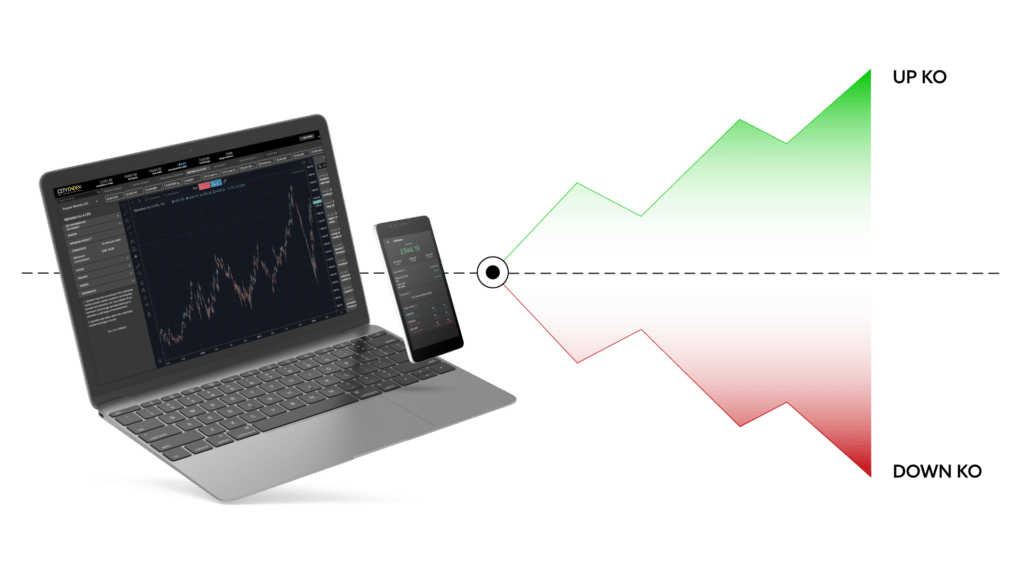Gain Capital (recently acquired by StoneX) subsidiary City Index has launched a new options product via its Singapore and Australian offices. The new product is an exotic option known as knockout, these type of options are not new to the market as a whole, but historically they have been the have largely been confined to banks, hedge funds and other institutions rather than private clients.
What are City Index Knockout Options?
Knock out options are delta one, that is they move point for point with the underlying instruments they are based on, in the same way, that a CFD does.
However, the option is knocked out or closed as and when the price reaches a preset level above or below the current price of the underlying instrument, depending on the direction of the trade.
- Thinking of trading with City Index? Read our City Index review first.
These new knockout options come in two flavours the Up KO and the Down KO and are somewhat similar to IG’s Turbo 24 Warrants.
Traders can only buy the options to open not sell them. And the options have a finite lifetime specified by the expiry date on the contract.
How do City Index Knockout Options work?
A trader would by an Up KO if he or she believed that particular market was likely to rise between now and the expiry date, and they could sell that option at any point between opening the trade and they expiry assuming that the knockout isn’t triggered, which if course kills the option if it is.
If the underlying market moves against you, for example, falling when you are long of an Up KO then you will lose money but that loss is limited by the level of the knockout.
Knockout options are priced based on the differential between the current price of the underlying instrument and the knockout (or stop loss) and are traded in a number of dollars per point. Such that a $5 per point trade with a knockout set 100 points below the market has margin and maximum risk of $500.00 and a value of 100.
If the price of the underlying instrument moves in your direction by say, 50 points, your option is now worth 150 and you have made a running 50 point profit for each dollar per point you have traded in.
At $5 per point that would be $250.00. Of course, if the price had moved against you by 50 points the converse would be true i.e. you would have a running loss of $250.00.
The knockout options will be available on FX, Indices and Commodities.
Are City Index Knockout Options any good?
On the face of it, these new options are a cheaper way to put on a limited risk trade than a CFD with a guaranteed stop loss on the same market.
However, CFD contracts are opened ended without an expiry date, though they must be funded. Whilst the knockout option does have a fixed expiry date.
If your time horizon on a trade extends beyond the expiry date of the option then the CFD may be the better bet. Although it might be worth running the numbers on the funding charges if you are active medium-term trader just to be sure.
It’s good to see some product innovation and customer choice though as ever where options trading is concerned a little knowledge is a dangerous thing and its best to make sure you fully understand the limited life cycle of the product and the risk-reward profiles that knockout options contain before you trade them.

With over 35 years of finance experience, Darren is a highly respected and knowledgeable industry expert. With an extensive career covering trading, sales, analytics and research, he has a vast knowledge covering every aspect of the financial markets.
During his career, Darren has acted for and advised major hedge funds and investment banks such as GLG, Thames River, Ruby Capital and CQS, Dresdner Kleinwort and HSBC.
In addition to the financial analysis and commentary he provides as an editor at GoodMoneyGuide.com, his work has been featured in publications including Fool.co.uk.
As well as extensive experience of writing financial commentary, he previously worked as a Market Research & Client Relationships Manager at Admiral Markets UK Ltd, before providing expert insights as a market analyst at Pepperstone.
Darren is an expert in areas like currency, CFDs, equities and derivatives and has authored over 260 guides on GoodMoneyGuide.com.
He has an aptitude for explaining trading concepts in a way that newcomers can understand, such as this guide to day trading Forex at Pepperstone.com
Darren has done interviews and analysis for companies like Queso, including an interview on technical trading levels.
A well known authority in the industry, he has provided interviews on Bloomberg (UK), CNBC (UK) Reuters (UK), Tiptv (UK), BNN (Canada) and Asharq Bloomberg Arabia.
You can contact Darren at darrensinden@goodmoneyguide.com



